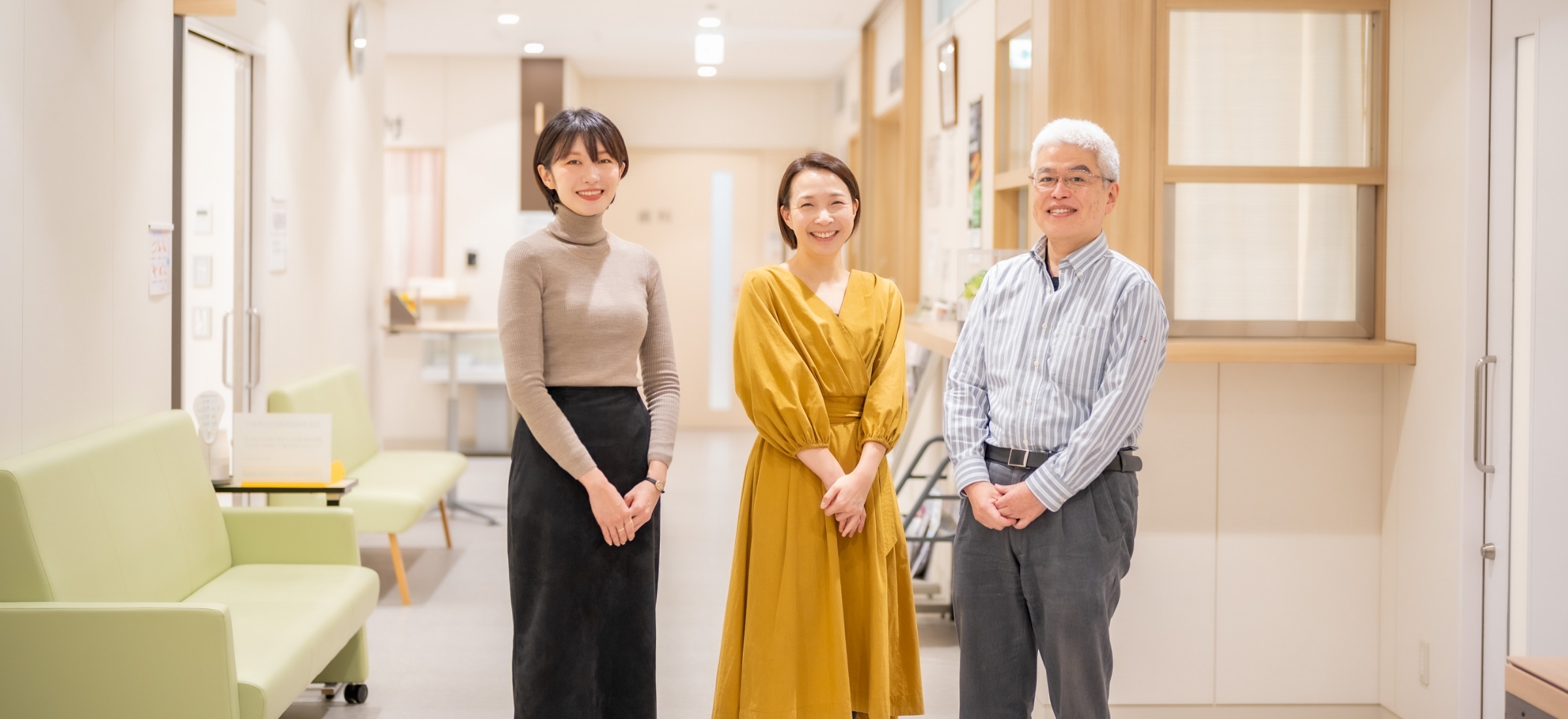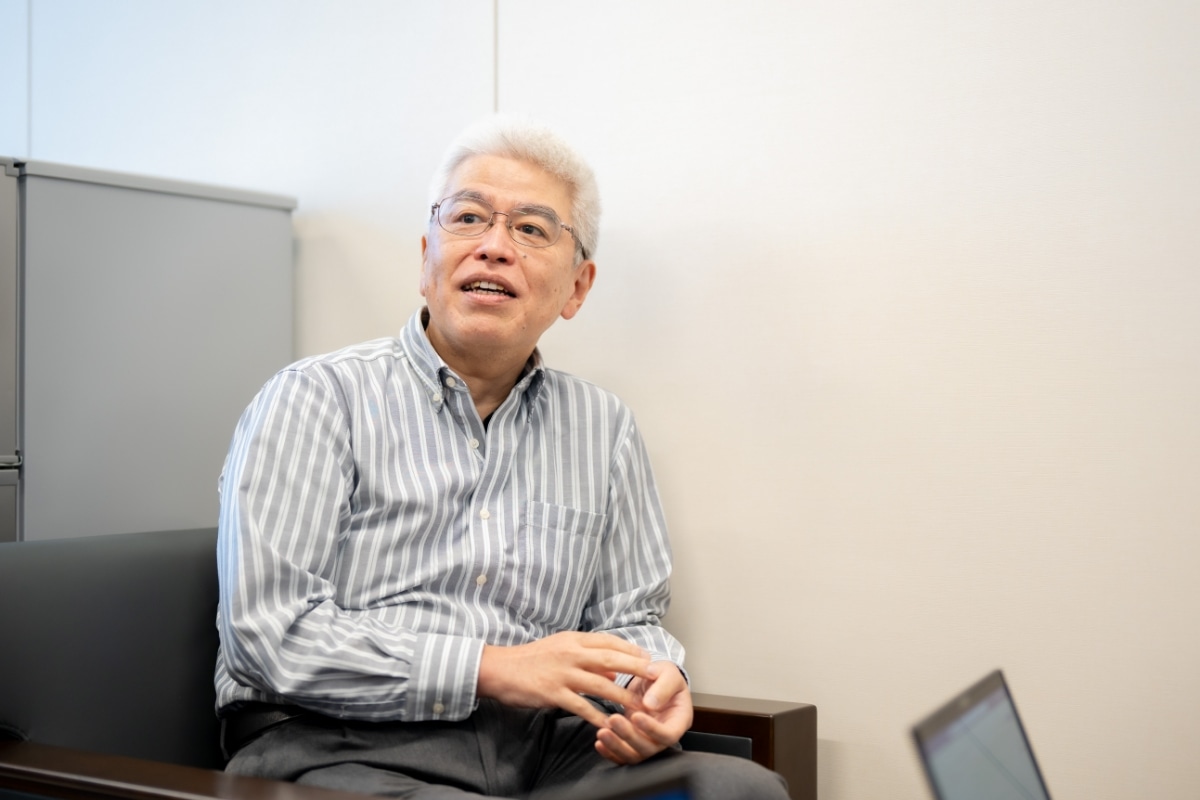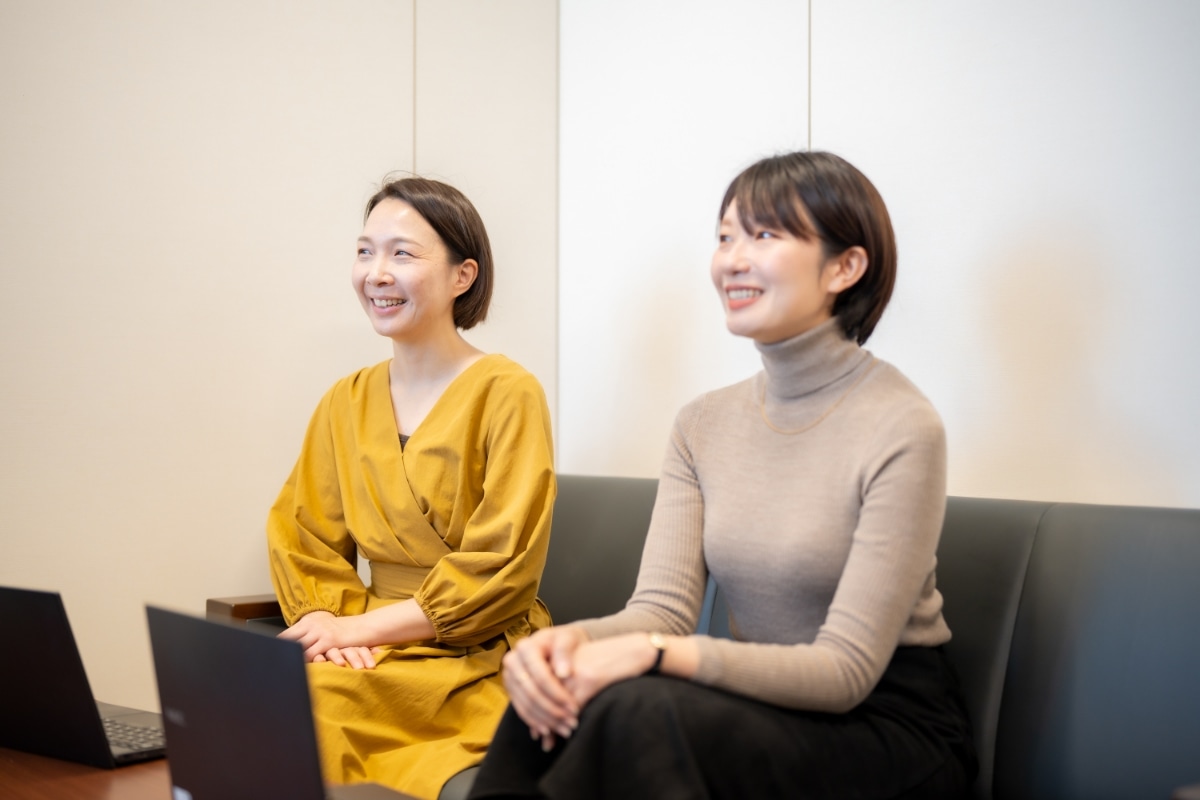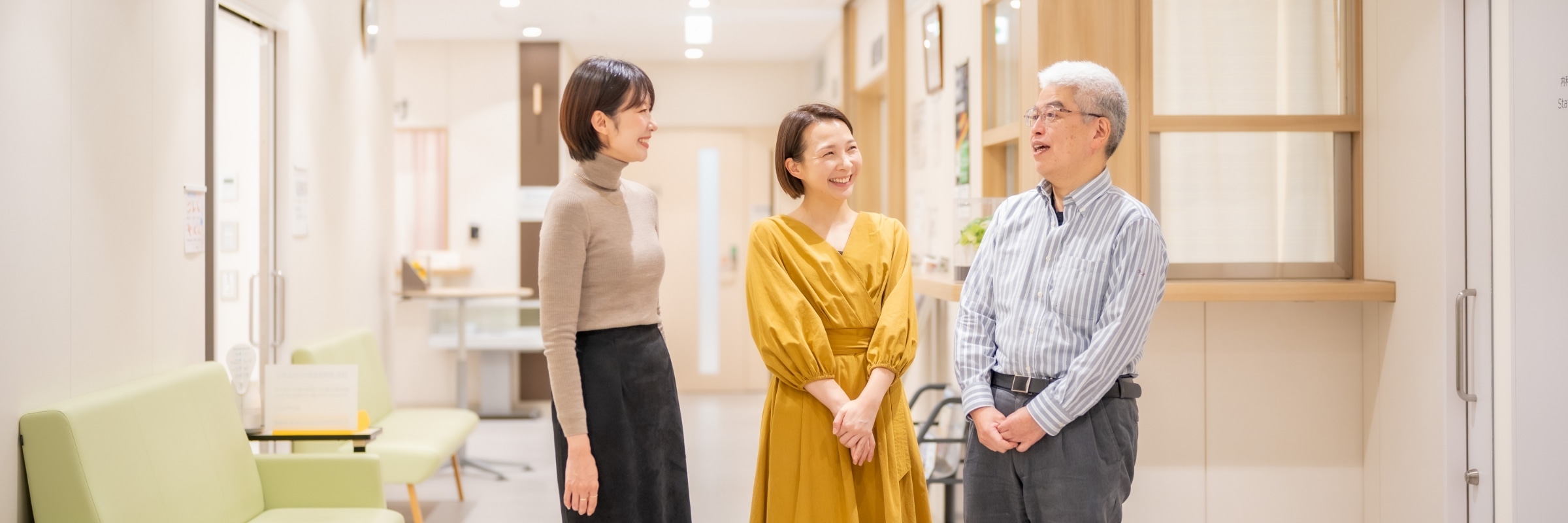Cross Talk
Health and Productivity Management Measures
Increase health consciousness and awareness to create better workplaces and expand individual possibilities.

Introduction
For the creation of new value, it is essential that all employees perform at their highest level. To this end, the first priority should be given to employee health. Based on this idea, Sumitomo Corporation is promoting health and productivity management.
In the following, HR members who are implementing measures based on the Declaration of Iki-iki Waku-waku Health and Productivity Management and the head of Sumitomo Corporation’s in-house clinic talk about health and productivity management measures.
Profile
Well-being Team, HR Solutions Department

Mayumi Imai
Engages in the planning and organization of seminars and others about women’s health issues and femtech

Sayaka Nishihara
Engages in the management of employee health, including tasks related to regular health checkups, dental checks and health checkups for employees transferred overseas
Sumitomo Corporation’s in-house clinic

Yuji Morisawa
Head of the clinic
(As of November 2023, when the interview was conducted)
Chapter 01Supporting each and every employee based on a comprehensive health promotion support system
——First, please introduce the measures taken by your department to help employees improve their own health.

Nishihara:

Morisawa:
The in-house clinic has doctors specializing in internal medicine and dentistry as well as a psychosomatic physician. It also has a highly professional medical treatment system to keep up with the sophistication of medical services. As for me, I have been at the in-house clinic for about 30 years in total, including the period before I started working there full time.

Imai:
On the theme of supporting employees in making work compatible with receiving medical treatment, we are also providing employees with support for managing chronic illness as well as general health management. For example, we give follow-up support to employees who have undergone health examinations at external medical facilities, including helping them to report the results to the company.

Morisawa:
As an industrial physician, I interview employees working long hours and those who are diagnosed as experiencing excessive stress based on their stress check results. I then make written recommendations to HR Dept about the work-related measures to be taken for these employees as it is now essential for companies to take care of their employees’ mental health. I also help employees seconded overseas to maintain their health as another of the important roles of an industrial physician working for an integrated trading company, “sogo shosha”. Each of these employees undergoes a health checkup that includes more test items than those stipulated by law. I provide extra support to expat employees suffering from a chronic illness to ensure that they can continue to receive medical treatment in the countries where they work. If there are concerns about the local medical services in a country to which a chronically ill employee is to be transferred, I may inform the employee’s department accordingly and ask them to reconsider the secondment itself. In addition, I check the local environment in each country and see what kinds of vaccinations are recommended to protect expat employees against infection with an endemic disease.

——So employees are provided with substantial support regarding their health. The clinic also provides dentistry services, doesn’t it?

Nishihara:
Generally speaking, in-house clinics mainly offer internal therapies, but Sumitomo Corporation’s clinic also provides dental services, which may be unique to the company. This shows how much importance it attributes to the management of its employees’ health.

Morisawa:
Mental and physical health and dental health are actually deeply intwined. Dental problems can cause other physical conditions. And some people clench their teeth due to mental stress, which can cause a range of health issues. Based on this recognition, we give employees instructions regarding dental health, including how to brush their teeth, from the viewpoint of preventive medicine.

Imai:
In addition to providing internal and dental therapies at the clinic, we also support employees’ mental health at the SCG Counseling Center while maintaining strict confidentially. Moreover, we have the “Koriton” massage room where employees can pop in for a massage during their break and at other times. Furthermore, residents of the company’s dormitory for unmarried employees are making effective use of the dormitory gym to maintain their health. By establishing these health promotion facilities, we are aiming to make improvements in the areas of presenteeism and absenteeism.*

* Presenteeism refers to a situation in which an employee is present at the workplace but their productivity is falling due to a health problem. Absenteeism refers to a situation in which an employee cannot conduct business operations as a result of tardiness, leaving early, being absent from the workplace or taking leave due to mental or physical problems.

Chapter 02Improving employees’ health literacy through health seminars
——You are also conducting a range of awareness-raising activities under the HR banner, right?

Nishihara:
In order to increase employees’ health literacy, we are regularly sharing information via the intranet and email. In addition, we have an archive of our health seminar videos for distribution to Sumitomo Corporation Group employees and their families. The ideal situation would be for employees to manage their health autonomously, but in reality they tend to not think about their health too much, especially those who are young and energetic. In fact, when I was working in the business group, I tended to put health checkups off to a later date, too.

Imai:
There are lots of employees who are not only tough but diligent and who tend to keep working hard even when all is not fine. However, it is too late to take care of yourself after your health is gone. You need to be conscious about your mental and physical health while your health is good so that you can notice any changes to your mental or physical state. We want all employees to know that they can get advice from the in-house counseling service about any health problems whatsoever, even minor ones, and we are holding health seminars on various themes.

Nishihara:
We held a range of seminars on themes such as appropriate drinking, mental health, sleep, women’s health and menopause/andropause. In the seminar held recently on menopause/andropause, a total of 170 employees participated, both male and female. As menopause/andropause is a topic that is often treated as taboo, not enough information is available out in the world and there seemed to be not a small number of employees who had some concerns. I think the seminar helped such employees get a better understanding of it so they could go on working with peace of mind.

Morisawa:
Menopause/andropause can cause various symptoms in women and men, and the symptoms can differ from one person to the next. Just as menstrual pain differs from person to person, some might suffer much more than others due to menopause/andropause, and knowing this undoubtedly helps enhance mutual understanding in the workplace.

Imai:
Yes, indeed. For the creation of a sound workplace through health and productivity management, employees need to understand the health problems faced by those around them and give due consideration to such problems in addition to paying attention to their own health. To this end, we run a mental health seminar to teach managers how to deal with a person who is suffering from a mental health problem in the workplace.


Chapter 03Health and productivity management also leads to the promotion of diversity, equity & inclusion.
——You are also implementing measures from the viewpoint of diversity, equity & inclusion.

Morisawa:
Yes. For diversity, equity & inclusion, it is also important to promote mutual understanding about the influence that biological gender differences and others exert over our physical state and our health. Ms. Imai, you are sharing related information, aren’t you?

Imai:
Yes. For example, we held an exhibition on femtech in FY2022 as an internal event to introduce products and services that can help solve or mitigate the health issues peculiar to women, including those related to menstruation, menopause, infertility and childbirth. The goods and services introduced at the event include period underwear, menstrual cups, pelvic floor muscle training products and nursing bras as well as an online prescription service for low-dosage birth control pills and an online advisory service for coping with menopause. Comments about the exhibition included an opinion that the hurdle to introduce the goods was lowered because visitors could actually handle the goods whereas online they could only view them. I think we were able to offer new options to solve the mental and physical problems faced by women in their daily lives through the event. Although women-specific health issues still tend to be regarded as taboo, I believe it is important to make these issues more widely known among people other than the women who are actually suffering from them, thereby deepening mutual understanding among members of the workplace and helping increase the overall health literacy of employees.

Nishihara:
Although it might be impossible to stop women-specific physical changes from taking place, it is possible for women to improve their mental and physical health by making effective use of various products and services. I hope that we can provide them with opportunities to recognize this. I myself used to think that I had to work even when I did not feel well, but now I know that presenteeism can be eliminated and am eager to communicate this to others.

Morisawa:
Furthermore, all employees are asked to attend the LGBTQ+ training, meaning you are conducting activities from various angles.

Imai:
Yes, indeed. The training represents one of the measures to help employees understand others. In order to create an even stronger organization, we hope to continue to conduct a range of activities by taking a broad view. Recently the percentages of female employees and those employed through mid-career recruitment have been increasing, leading to further diversification of employees’ life plans and career plans. Against this backdrop, it is becoming even more important to manage employees’ health to ensure that each of them can continue working for many years and can expand their career possibilities.

Nishihara:
Sumitomo Corporation’s commitment to health and productivity management is demonstrated through various initiatives, including the benefit service that allows employees to use the points awarded for a menu of their choice. Under this plan, employees can make more effective use of their points by exercising at a gym or purchasing a product that helps increase the quality of their sleep. I think this benefit service is proof of the company’s strong commitment to supporting employees’ health maintenance and promotion. We will continue to help employees manage their health so that they can lead vigorous and fulfilling lives, both at work and at home.


Under the HR banner, we are implementing a range of measures for health and productivity management, including operating the in-house clinic, which is located at the head office. Clinic head Dr. Morisawa and other medical practitioners are working tirelessly at the clinic to support employees in maintaining their health.